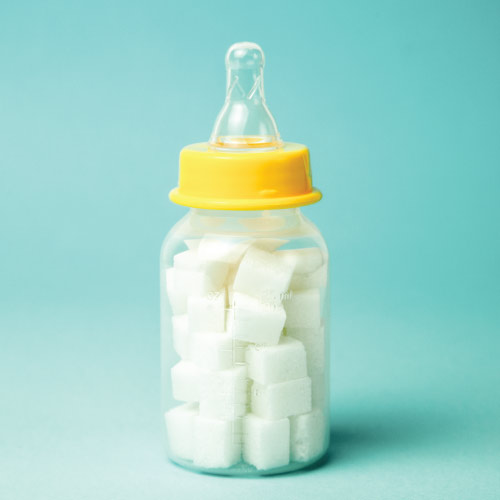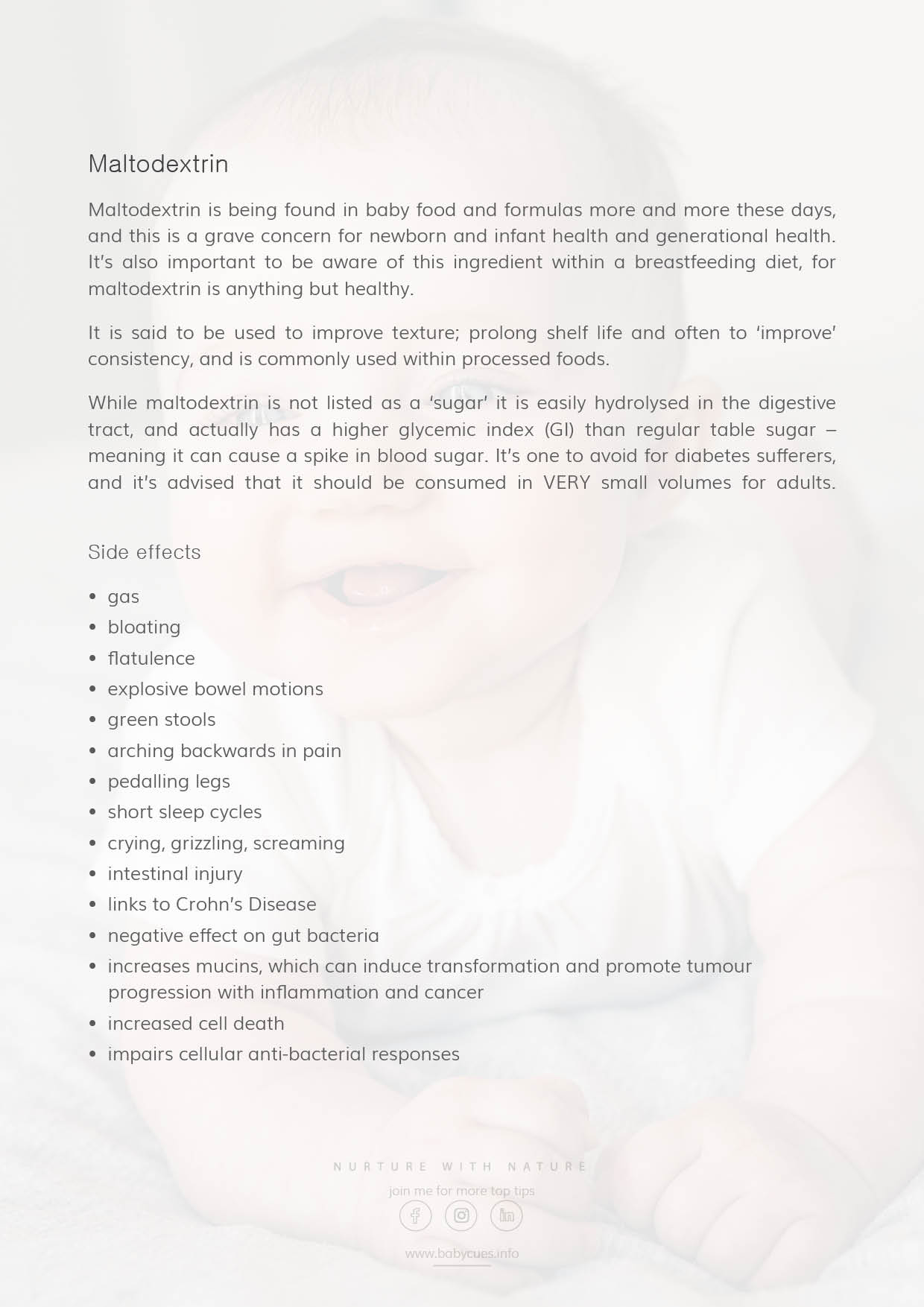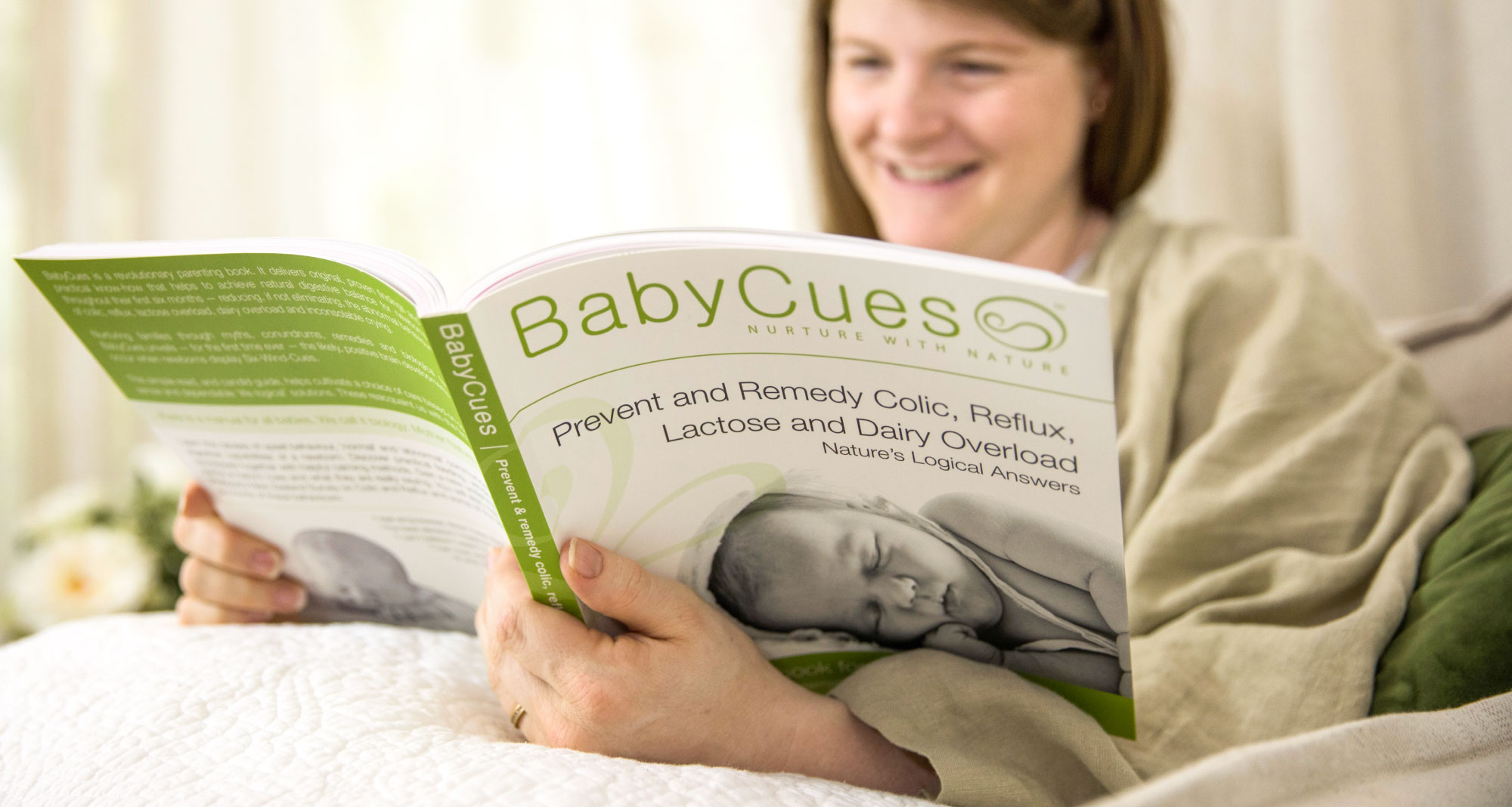Maltodextrin in baby formula - please avoid

Maltodextrin is fast making it's way into our food chain, and given the research of this 'ingredient' one must ask why? And even more importantly, why is this being put into baby formula, and baby food when it has never previously been required, and the effects on health are atrocious, if the research is true.
What is maltodextrin?
Maltodextrin is a polysaccharide that is used as a food additive. It is produced from vegetable starch by partial hydrolysis and is usually found as a white hygroscopic spray-dried powder. Maltodextrin is easily digestible, being absorbed as rapidly as glucose and may be either moderately sweet or almost flavorless (depending on the degree of polymerisation). It is commonly used for the production of soft drinks and candy. It can also be found as an ingredient in a variety of other processed foods.1
Used as a thickener in infant formula, milk thickeners, and commercial baby food, maltodextrin has a glycemic index ranging from 185 to 105. When we consider that pure glucose has a glycemic order of 100 and the side effects of this are obesity, an increased risk of heart disease, type 2 diabeties and cancer, one has to ask, why oh why is this being put into baby formula and commercial baby food?
What do the experts say about maltodextrin?
For further information on this I suggest you start by reading the research from Harvard Medical School2 where they studied the effects of ‘maltodextrin-dominant human infant formula’ on neonatal mice. It states that, ‘mice in all M groups demonstrated reduced body weight, increased small intestinal dilatation and increased intestinal injury scores. Maltodextrin-dominant infant formula with hypoxia (reduced oxygen levels) led to intestinal injury in neonatal mice accompanied by loss of villi, increased MUC2 production, altered expression of tight junction proteins, enhanced intestinal permeability, increased cell death and higher levels of intestinal inflammatory mediators. This robust and highly reproducible model allows for further interrogation of the effects of nutrients on pathogenic factors leading to intestinal injury, and what is known as Necrotizing Enterocolitis (NEC) in preterm infants.”
In regards to maltodextrin increasing MUC2 production, a family of high molecular weight, heavily glycosylated proteins (glycoconjugates) produced by epithelial tissues in most animals, research shows a critical link between imbalance causing many cancers.
The National Institute of Child Health and Human Development defines NEC as “infection and inflammation in the child’s gut, which may stem from the growth of dangerous bacteria or the growth of bacteria in parts of the intestine where they do not usually live.”3
A recent NICHD-supported study found that a common type of medication, sometimes given to infants for acid reflux and called “H2-blockers,” (e.g. Ranitidine) was associated with a slight increase in the risk of NEC in preterm infants.4 Another study “determined that maltodextrin impairs cellular anti-bacterial responses and suppresses intestinal anti-microbial defense mechanisms.”5
Top Five Ingredients To Avoid
With the fast paced changes in additives these days, these are five that all parents need to know about for the long-term health of their child.


- In depth summary of each ingredient
- Research based information
- Side effects of each additive


WHAT'S INSIDE
- In depth summary of each ingredient
- Research based information
- Side effects of each additive
Side effects of maltodextrin
Maltodextrin can contribute to colic, reflux, silent reflux, the witching hour and lactose and dairy overload symptoms, causing those listed below, and then the more long term side effects:
- gas
- bloating
- flatulence
- explosive bowel motions
- green stools
- arching backwards in pain
- pedalling legs
- short sleep cycles
- crying, grizzling, screaming
- intestinal injury
- links to Crohn’s disease
- negative effect on gut bacteria
- increases mucins, which can induce transformation and promote tumour
- progression with inflammation and cancer
- increased cell death
- impairs cellular anti-bacterial responses
So what to do?
Well, I strongly suggest that you avoid maltodextrin at all costs! If your baby is on a formula with this in, then consult with your health provider and ask them for an alternative. Also read the labels on all processed foods. You may be amazed how much you see this in your child’s products and yours.
You may also want to book in a consultation with me, or purchase my self-help book to see how you can further help some of the symptoms listed above. Oh, and of course, if you may like my FREE booklet on the Top Five Ingredients to Avoid for you and your child.
- Maltodextrin - Wikipedia
- Maltodextrin-induced intestinal injury in a neonatal mouse model
- What causes necrotizing enterocolitis
- NICHD. (2006). Common reflux treatment linked to life threatening bowel infection in premature infants [news release]. Retrieved August 2, 2012,
- Deregulation of intestinal anti-microbial defense by the dietary additive, maltodextrin



 Submitting data
Submitting data